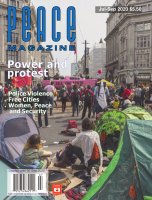
Peace Magazine Jul-Sep 2020, page 7. Some rights reserved.
Search for other articles by Jan Noel here
The sparse mention of international conflicts in the daily news feed during the early months of 2020 might have offered solace to readers of Peace Magazine. It was heartening when the pandemic nudged medical researchers toward wider cooperation and even caused some governments to share medical supplies with harder-hit nations. Given this surge of fellowship and focus on the health of nations, has the arms race taken a salubrious downward turn?
Such a question, and the sudden confinement of millions of people indoors, brought concentrated attention to the release of new figures by the Stockholm International Peace Research Institute (SIPRI) in April. Conditions were anything but normal; and due to the pandemic, the press conference was held online. The medical emergency made it apparent to the far-flung audience how the prioritization of military spending worldwide is in massive imbalance with other, life-sustaining, sectors.
The report made it clear that if change is possibly in the cards, it has not happened yet. In 2019, global military spending reached another record level with an increase of 3.6 percent compared to 2018, thereby continuing the global trend of arms races in recent years. Tarja Cronberg, Fellow at SIPRI, interpreted the increase and especially the spending of the USA, China and Russia—all among the top five—as proof of the increasing rivalry between the three major powers. The United States alone accounted for 38% of global arms expenditure. China continued aspiring to superpower role with 14% of expenditures, that figure being tallied up even as the virus began taking lives in Hubei province in December 2019.
Alongside the chief destroyers with their growing nuclear arsenals came the usual clump of unrepentant mid-range spenders. Germany came eighth, behind France and the UK, with a 10% increase in its budget compared to 2018.
The 29 NATO states together accounted for almost half of all military spending worldwide, at $1,305 billion. Other major economic powers also stood out, almost without exception recording an increase.
In contrast, the largest declines appeared in African countries and some states in the Middle East, where military conflicts nevertheless continue. All told, the $1,917 billion in global arms expenditure in 2019 can only astonish by its sheer size: $1,917 billion per year means global military spending of $60,800 per second.
Will the pandemic lead to budgets that prioritize real human needs? Karin Vogler, a politician with Germany’s Die Linke (the Left), reflected how Covid-19 highlights the problems caused by allocating too much to the military. She notes that consequences can be serious if social and health care systems are inadequate to cushion the pandemic’s urgent economic and social effects. Vogler pointed also to an imminent famine which the United Nations World Food Programme warns may follow Covid-19. “With 13.5% of global military expenditure, every person on earth could have something to eat every day,” she notes, signalling how dysfunctional the priorities are.
In today’s unprecedented change of channel, some are calling for a reinvigorated peace movement. Could there be a new readiness to reallocate military spending to infrastructure, education, health, social affairs and development? “Humanity needs bread, not bombs,” the Pope announced to an eerily empty St. Peter’s Square in his 2020 Easter blessing. Philip Jennings, Co-President of the International Peace Bureau, voiced a similar opinion: “It is time for global solidarity … time for a peace movement. SIPRI’s dark and frightening figures must be followed by a lively, optimistic, and ambitious response. Civil society must exert pressure and introduce the dimension of peace into the global discourse.”
Can you, our reader, gradually emerging from months of isolation, possibly summon up fresh hope, seek out new allies and different approaches? This is, after all, a year that has seen profound changes in how the world works, and a heartening concern to prevent deaths across our common home, planet Earth.
Jan Noel is an editor of Peace Magazine.

Peace Magazine Jul-Sep 2020, page 7. Some rights reserved.
Search for other articles by Jan Noel here